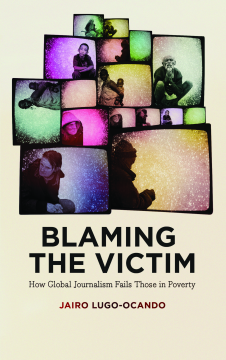
Additional Information
Book Details
Abstract
Poverty, it seems, is a constant in today's news, usually the result of famine, exclusion or conflict. In Blaming the Victim, Jairo Lugo-Ocando sets out to deconstruct and reconsider the variety of ways in which the global news media misrepresent and decontextualise the causes and consequences of poverty worldwide. The result is that the fundamental determinant of poverty - inequality - is removed from their accounts.
The books asks many biting questions. When - and how - does poverty become newsworthy? How does ideology come into play when determining the ways in which 'poverty' is constructed in newsrooms - and how do the resulting narratives frame the issue? And why do so many journalists and news editors tend to obscure the structural causes of poverty?
In analysing the processes of news production and presentation around the world, Lugo-Ocando reveals that the news-makers' agendas are often as problematic as the geopolitics they seek to represent. This groundbreaking study reframes the ways in which we can think and write about the enduring global injustice of poverty.
'The book should be read by everyone interested in way the media deal with issues of economic inequality and injustice'
Democratic Communiqué
'Provides the clearest of reasons for setting aside the traditional rules of journalism'
Danny Dorling, author of Inequality and the 1% and All That Is Solid
Table of Contents
| Section Title | Page | Action | Price |
|---|---|---|---|
| Cover | Cover | ||
| Contents | v | ||
| List of Tables | vi | ||
| Acknowledgements | vii | ||
| Introduction | 1 | ||
| 1. The Subjectivity of Poverty | 15 | ||
| 2. The Poverty of Ideas in the Newsroom | 36 | ||
| 3. What Lies Beneath? | 60 | ||
| 4. Africa, That Scar on Our Face | 85 | ||
| 5. Visual Journalism and Global Poverty | 104 | ||
| 6. Spinning Poverty! | 124 | ||
| 7. The Emergence of Alternative Voices | 145 | ||
| Conclusion: Beyond the Unsustainable News Agenda | 166 | ||
| Notes | 177 | ||
| References | 181 | ||
| Index | 213 |
